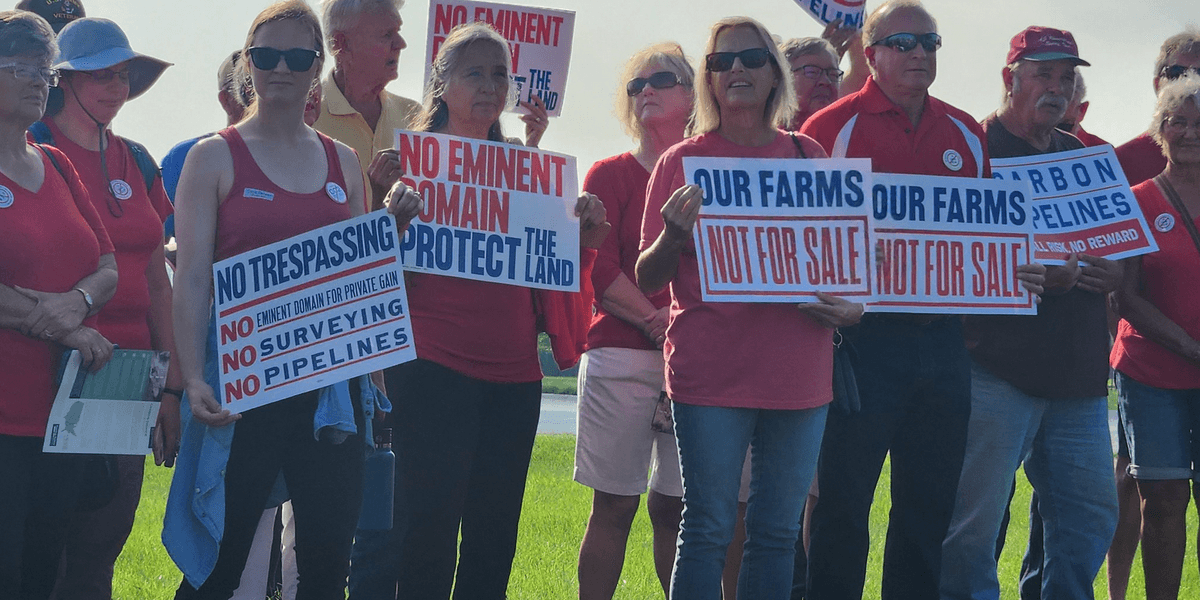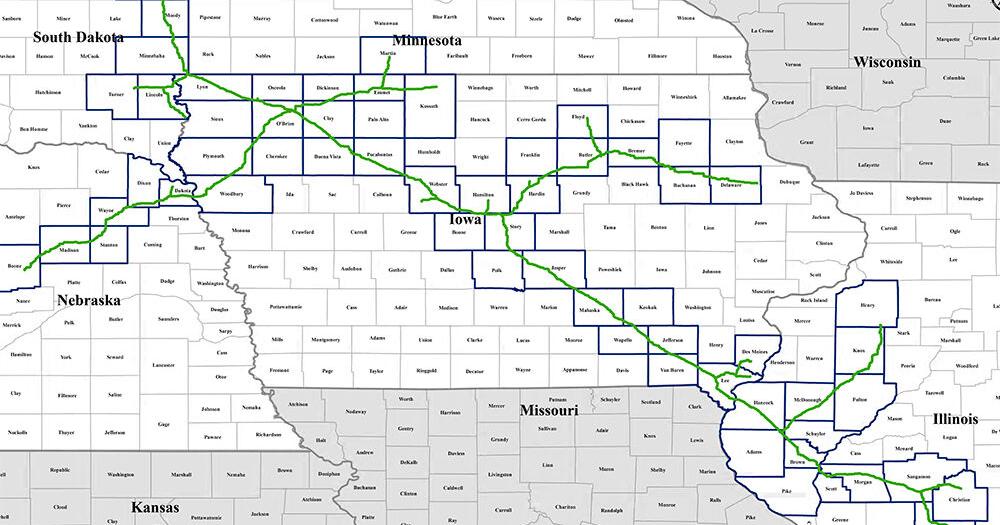
The Risks of Carbon Capture – Non Profit News | Nonprofit Quarterly
Carbon capture, also known as carbon capture and storage (CCS) or carbon sequestration, is a process that captures carbon emissions from industrial processes or power plants and permanently stores it underground.1 The Global CCS Institute, a think tank dedicated to researching and developing the technology behind CCS, calls the technology a “game-changer” that can build a path to a “zero-carbon economy.”2 But it is not without risks.
While proponents of the technology say it can reduce the effects of carbon emissions and play a crucial role in combating climate change, environmental justice organizations are speaking out in Louisiana, one of the states where a number of these sites are being proposed. The Deep South Center for Environmental Justice (DSCEJ) says that CCS allows the fossil fuel industry to skirt real responsibility on climate change; moreover, the state’s lack of oversight and accountability will create harmful impacts on communities already affected by environmental disasters.
Illustrating CCS
There are three steps in the CCS process.3 The first step is “capturing” the carbon, often from the air, from places like power plants, by using post-combustion capture technology. After carbon is released from combustion, chemical solvents or adsorbents are often used to trap the carbon, allowing clean exhaust gasses to be released into the atmosphere.
Fossil fuel companies can say that they’re complying with environmental regulations [through carbon capture and storage] without having to fundamentally change their high-emission business practices.
The second part of the CCS process involves transporting the carbon from the capture site to the storage site. The transportation process typically involves pipelines, ships, or trucks. The choice of transportation method depends on the distance between the capture site and the storage site.
Third, the captured carbon is then permanently stored deep underground in geological formations—the most common sites being depleted oil and gas reservoirs, saline aquifers, and un-mineable coal seams. When carbon is injected into these formations, it is trapped and stored securely over geological timescales, preventing its release into the atmosphere.
In the United States, ongoing monitoring and verification of the various sites and pipelines is done by regulatory authorities such as the EPA. Monitoring involves detecting any potential leaks or movement of the stored carbon. While CCS is a proposed climate solution, there is pushback with the belief that the process is another ploy from Big Oil.
Basav Sen, director of the Climate Policy Project at the Institute for Policy Studies, says CCS projects are advocated by the business interests of the fossil fuel industry, which continues to make money off of gas.
“The push for carbon capture is really an attempt to reconcile continuing that business model with the imperative of having to cut greenhouse gas emission,” says Sen. In other words, fossil fuel companies can say that they’re complying with environmental regulations without having to fundamentally change their high-emission business practices.
Tax Codes and Fossil Fuel Companies
Monique Harden, director of law and public policy and community engagement program manager for the DSCEJ, says tax codes are another reason behind the sudden push for these sites in Louisiana and elsewhere.
“For every ton of carbon dioxide they put in the ground, they get $85. These projects that they’re proposing begin at five million tons. That’s [just] under half a billion [dollars],” says Harden.
CCS is a money maker for the fossil fuel industry and approved by Congress under tax credit policies. Section 45Q is a tax code originally proposed in 2008 as part of the Energy Improvement and Extension Act that permits a credit for carbon sequestration to reduce greenhouse gas emissions.4 This is a giant loophole of which the fossil fuel industry is fully taking advantage.
The Inflation Reduction Act, passed in 2022, expanded several provisions under the tax code. The expanded provisions increase the credit amount that emitters can get and reduce eligibility requirements so more power plants could qualify.
Harden believes that the proposed carbon injection sites are stalling efforts to transition away from oil and gas. The injection sites also curtail efforts such as DSCEJ’s “renewable portfolio standard,” which requires electricity supplied to a jurisdiction to come from renewable energy sources. The organization worked with the city of New Orleans to enact a requirement that by the year 2040, all sources of electricity supply into the city of New Orleans come from renewable and non-carbon sources of energy.
“We now have a Public Service Commission for the state of Louisiana that is looking to do more on renewable energy. And also developing a workforce that will have people install and maintain solar panels,” says Harden.
Sign up for our free newsletters
Subscribe to NPQ’s newsletters to have our top stories delivered directly to your inbox.
By signing up, you agree to our privacy policy and terms of use, and to receive messages from NPQ and our partners.
However, building carbon injection sites across the state creates barriers to fully transitioning away from burning coal, oil, and gas. Fossil fuel companies and state officials are pushing forward with these sites despite community objections. It’s clear that the fossil fuel industry does not want to give up its business model.
Disproportionate Risk
There are two major factors under consideration in developing CCS projects in Louisiana: building locations and regulations. Fossil fuel companies are pushing for a new wave of gas-burning facilities mostly located in areas where the residents are predominantly Black, Indigenous, and poor.5
At the same time, lobbyists are persuading policymakers that CCS projects are a way to preserve jobs and transition to low-cost models of climate friendly technology. In October of 2021, four oil executives testified before the House Committee on Oversight and Reform to defend their companies’ practices over the years. The executives also attempted to reframe the narrative around burning fossil fuels, calling itself a “carbon management industry.” According to Sen, lobbyists are also persuading policymakers that CCS projects are a way to preserve jobs and transition to low-cost models of climate-friendly technology.
In Louisiana, the state filed an application with the EPA to have regulatory authority over the wells that are used to inject carbon into deep rock formations and store them underground. DSCEJ opposed the state’s application in a public hearing before the EPA pointing to previous environmental failures. DSCEJ cited “a record of failure and mismanagement that resulted in destroying the Bayou Corne community, harming children and adults in Grand Bois [a predominantly Native American community] and leaving the state littered with leaking oil and gas wells,” according to a June 2023 press release. The press release also notes a 2020 carbon pipeline explosion in Satartia, MS, where 200 people were evacuated and 45 were hospitalized.
Exposure to carbon can cause disorientation, heart malfunction, and even death in extreme cases.6 Clouds of carbon dioxide can displace oxygen and can hang in the air for hours. One 911 call obtained by the Climate Investigation Center paints a picture of what happened when the pipeline broke, the caller describing a victim stranded on the side of the highway: “She’s laying on the ground and she’s shaking. She’s kind of drooling out of the mouth. I don’t know if she’s having a seizure or not. Can you send somebody quick!”
The capture of carbon can lead to reduced efficiencies in power and industrial plants, while simultaneously increasing their water consumption. This is a particular challenge for plants operating in regions already grappling with water scarcity.
Questionable Technology
There are clearly risks associated with CCS. The biggest concerns are the potential leakage of stored carbon and induced seismicity, which is earthquake activity caused by humans. Leakage could result from structural failure, geological instability, or poor containment integrity, leading to the release of large quantities of carbon into the atmosphere that can exacerbate climate issues and health problems.
Carbon corrosion can break down metals in pipelines and potentially contaminate the environment, including waterways and drinking water sources.7 Corrosion can also break down rocks and cause catastrophic shifts above ground.8 Penn State researchers point out the number of ways carbon dioxide can escape. 9 This makes CCS a questionable long-term solution for climate change if these sites become unviable.
Organizations like the Climate Justice Alliance see carbon capture as another form of geoengineering that manipulates efforts to stop climate change and continues our dependence on fossil fuels.
The economic viability of CCS projects is also in question. The capture of carbon can lead to reduced efficiencies in power and industrial plants, while simultaneously increasing their water consumption.10 This is a particular challenge for plants operating in regions already grappling with water scarcity. These additional expenses have the potential to render a CCS project economically unfeasible as well as environmentally harmful.
Fossil fuel companies continue to lobby for CCS sites in areas throughout the South. Communities and the surrounding environments face substantial risks with the unprecedented undertaking of permanently storing carbon dioxide underground. Harden says the proposed site locations are intentional: “[The fossil fuel] industry has systematically located those polluting facilities in communities where they thought that people would not have the power to fight back,” says Harden.
Organizations like the Climate Justice Alliance see carbon capture as another form of geoengineering that manipulates efforts to stop climate change and continues our dependence on fossil fuels. In early June, advocates for climate justice and carbon removal met in Wisconsin for the 2023 National Symposium on Climate Justice & Carbon Management. Although full details of the symposium could not be shared, Jean Chemnick reported for E&E News by Politico that participants said there was a realization “[the] US was going all in on carbon capture and carbon removal, with or without the support of the environmental justice community.”
As of now, a holistic consideration for CCS is lacking and these projects come at the expense of already environmentally burdened communities. Environmental justice advocates continue to push back to protect those communities, and are making the case that these proposed “solutions” are anything but.
Notes:
- Berend Smit et al., Introduction to carbon capture and sequestration (World Scientific, 2014), https://doi.org/10.1142/p911.
- Global CCS Institute, Global Status of CCS Report: 2020, https://www.globalccsinstitute.com/resources/publications-reports-research/global-status-of-ccs-report-2020/.
- José C.M. Pires et al., “Recent developments on carbon capture and storage: An overview,” Chemical Engineering Research and Design 89, no. 9 (2011): 1446–1460, https://doi.org/10.1016/j.cherd.2011.01.028.
- Legal Information Institute, 26 U.S.C § 45Q – Credit for carbon oxide sequestration, https://www.law.cornell.edu/uscode/text/26/45Q.
- Lara J Cushing et al., “Up in smoke: characterizing the population exposed to flaring from unconventional oil and gas development in the contiguous US,” Environmental Research Letters 16, no. 3 (2021): 34–32, https://doi.org/10.1088/1748-9326/abd3d4.
- Michael Drechsler and Jason Morris, Carbon Dioxide Narcosis (Treasure Island, FL: StatPearls Publishing, 2023).
- Robin L. Newmark, Samuel J. Friedmann, and Susan A. Carroll, “Water Challenges for Geologic Carbon Capture and Sequestration,” Environmental Management 45 (2010): 651–661, https://doi.org/10.1007/s00267-010-9434-1.
- Joel Sminchak and Neeraj Gupta, “Aspects of induced seismic activity and deep-well sequestration of carbon dioxide,” Environmental Geosciences 10, no. 2 (2003): 81–89, https://doi.org/10.1306/eg.04040302009.
- Penn State. “Carbon dioxide stored underground can find multiple ways to escape.” ScienceDaily, (2016), https://www.sciencedaily.com/releases/2016/02/160211185935.htm.
- Hisham Eldardiry and Emad Habib, “Carbon capture and sequestration in power generation: review of impacts and opportunities for water sustainability,” Energy, Sustainability and Society 8, no. 6 (2018), https://doi.org/10.1186/s13705-018-0146-3.







